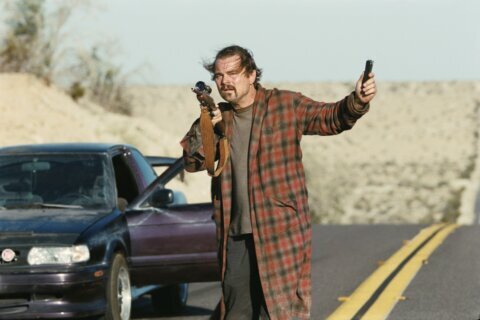WASHINGTON — Movie critics are like Roman emperors, holding their fists out to command a chanting crowd with the drama of a thumbs-up or thumbs-down.
But the cinematic arena is no Coliseum; it’s a movie palace. And our beloved Caesar, the purveyor of so many thumbs, was Roger Ebert.
The late film critic is the subject of the new documentary “Life Itself,” which headlines the AFI Docs festival that began Wednesday and ends Sunday.
Formerly known as Silverdocs, the festival has expanded beyond the AFI Silver Theatre in Silver Spring, Md., to also include the National Archives, Naval Heritage Center, Goethe- Institut and National Portrait Gallery.
The latter venue is where you can attend my closing night Q&A with “Life Itself” director Steve James (“Hoop Dreams”), whose career was launched by word of mouth from Ebert and his “At the Movies” co-host Gene Siskel.
“When ‘Hoop Dreams’ was on its way to Sundance … Roger and Gene went on their show and reviewed the film. … Suddenly, distributors who had not even looked at the film and had no intention of looking at the film at Sundance were scrambling to get tickets thanks to Roger and Gene,” James says.
Siskel and Ebert had a similar effect on Erroll Morris (“The Thin Blue Line”), who caught the duo’s eye with his debut documentary “Gates of Heaven” (1978) about a California pet cemetery, and Ramin Bahrani (“Man Push Cart”), to whom Ebert gifted a cherished puzzle passed down from Alfred Hitchcock to Marilyn Monroe to Lee Strasberg.
Like searching for the “Rosebud” puzzle piece of “Citizen Kane” (1941), “Life Itself” similarly tries to get at the core of an old-school newspaper man who, in Ebert’s case, evolved his talents into television, the internet and social media. His critic career was born side-by-side with the Hollywood Renaissance in 1967, a year that saw “The Graduate,” “Bonnie and Clyde,” “Guess Who’s Coming to Dinner,” “In the Heat of the Night,” “In Cold Blood” and “Cool Hand Luke.”
James agrees that 1967 was a watershed year for “American film and world cinema,” and for Ebert to come up in that time was “pretty extraordinary.” He not only witnessed film history, he shaped it by winning history’s first Pulitzer Prize for a film critic and earning a star on the Hollywood Walk of Fame.
“Over the course of the next 50 years, he grew as a film critic. He grew into something of a film scholar in his own right, and he got to watch this profound and remarkable flowering of cinema.”
And yet, “Life Itself” is about more than movies, and it isn’t painted with rose- colored glasses. This is an honest portrait of a man, warts and all. It’s a man who left the Bedford Falls of his small Illinois town to seek fame in the big city of Chicago. It’s also a man who battled alcoholism, clashed with his TV co-host and ultimately battled a cancer that rendered him speechless.
With a surgically repaired face trapped in a permanent smile, Ebert’s stellar writing got even better. His love for his wife, Chaz, and family grew even stronger. And his appreciation for life grew even deeper.
Then again, that’s what movies always were to Ebert.
“For me, the movies are like a machine that generates empathy. It lets you understand the hopes, aspirations, dreams and fears. It helps us to identify with the people who are sharing this journey with us,” he once said.
The same thing can be said for James’ documentary, which hits theaters nationwide on July 4.
“This film, from my point of view, is not some downer,” James says. “There are certainly poignant and sad moments in it, of course, but Roger’s life was just full of life and full of humor, so it’s also quite an entertaining film about a very entertaining life.”
As “Life Itself” screens at AFI Docs, Siskel and Ebert will be hovering somewhere above the theater, looking down from the “Gates of Heaven,” debating the film like the gatekeepers they were, and ultimately giving James two thumbs up — just like life itself.
![]()
“Ivory Tower” explores student debt crisis
Before the “Life Itself” screening, AFI Docs offers many other documentaries on a range of topics.
The filmmakers deal with such pressing topics as the student debt crisis, as portrayed in Andrew Rossi’s “Ivory Tower,” which premiered at Sundance and plays Friday at the E Street Cinema in Northwest D.C.
“‘Ivory Tower’ is sort of a metaphor for all the building that’s been taking place on campuses. All of these tall towers are being built to try and reach the heavens like the tower of Babel,” Rossi says.
“They keep on building these huge facilities, but, ultimately, they’ll come crashing to the ground because no one can afford them anymore.”
By the time Rossi finished his previous documentary, “Page One: Inside the New York Times” (2011), student loan debt had exceeded $1 trillion. Economists warned that student loans could follow the housing crisis as the next big bubble to burst. And PayPal co-founder Peter Thiel even offered people $100,000 to drop out of school.
The problem has only gotten worse. Today, college tuition has risen by 1,120 percent since 1978, largely because state funding for colleges has dropped by 40 percent over the same period.
Rossi said the time was right to make a movie about the issue.
“I thought this is an opportunity to go on the ground in a range of campuses and see really what students are learning, what faculty are teaching, what’s working in college and what’s not working.”
The film tells a range of stories, following a once-homeless student now studying at Harvard University, the all-male students at Deep Springs in Death Valley, and the all-female students at the historically black Spelman College in Atlanta. At each stop, certain questions keep bubbling to the surface.
“How is it that student loan debt has become so out of control? What does college still do for young people as a sort of bridge from adolescence to adulthood? And is it still worth it? That’s the question everybody asks,” Rossi says.
![]()
“Whitey” investigates the case of James “Whitey” Bulger
“Ivory Tower” isn’t the only Sundance film to play at AFI Docs this year.
The festival also includes the crime documentary “Whitey: United States of America v. James J. Bolger,” directed by Joe Berlinger, who earned an Oscar nomination for the third installment of his “Paradise Lost” series about the West Memphis Three.
“Whitey” explores the charges against James “Whitey” Bulger, who spent 25 years atop Boston’s organized crime world and was once No. 2 on America’s Most Wanted list after Osama bin Laden.
“Many people say he was an FBI informant and that’s why he got away with murder,” Berlinger says.
“He was able to corrupt a lot of people in law enforcement in different agencies: the Massachusetts State Police, the Boston Police, the FBI, the DEA. He turned the Federal Bureau of Investigation into the Bulger Bureau of Investigation. He stuck his tentacles into that organization and paid people to give him information.”
Like “The Thin Blue Line” before it, Berlinger offers opposing sides of a true crime story told from different perspectives — including the accused — and lets viewers play the jurors.
“The film is very much a ‘Rashomon’ experience. There are multiple version of reality presented in this film, not the least of which is Bulger’s version of reality. This is the first time Bulger has ever gone on camera and participated in any project,” Berlinger says.
Bulger has become something of a pop culture fascination. Jack Nicholson’s character in “The Departed” (2006) is loosely based on him, Johnny Depp plays him directly in the upcoming film “Black Mass” (2015) and Matt Damon and Ben Affleck are also interested in a Bulger-based project.
If you have any interest in these upcoming “fiction” films, you may want to check out the documentary version first. “Whitey” screens at AFI Docs on Friday at 3:45 p.m. and hits select theaters June 27.
“The film separates the man from the myth,” Berlinger says.
Visit the festival’s website for a full list of the screenings.
Follow WTOP Entertainment and WTOP Film Critic Jason Fraley on Twitter @JFrayWTOP, read his blog The Film Spectrum, listen Friday mornings on 103.5 FM and see a full list of his stories on our “Fraley on Film” page.








